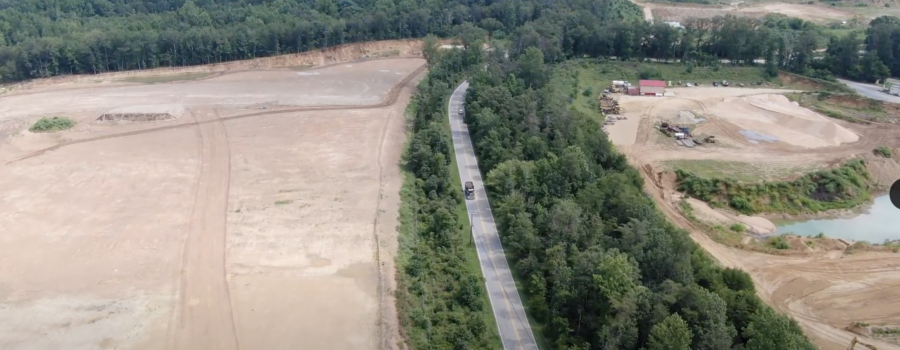The Westport Special Exception Challenge Continues
By: Patrick DeArmey
Westport Reclamation Services (“site” or “Westport”) is one of several industrial mining operations on Sands Road in Lothian, Maryland, a rural area inundated with industrial pollution sources. The effect of these operations and the pollution produced is oppressive and ever-present within the community and to anyone who drives or bikes down Sands Road hoping for a pleasant outing along a country road. The reality of life on Sands Road is a barrage of noise, dust, constant heavy-truck traffic, air, and water pollution, and in general, a degraded quality of life.
One of the main causes of these impacts is the several sand and gravel mining operations, like Westport, on Sands Road. These operations encompass hundreds of acres of disturbed land within the rural agricultural community along Sands Road. The impacts associated with these operations are wide-reaching and include, air and water pollution, noise, dust, and constant truck traffic. These operations along with at least four wastewater treatment plants and two closed solid waste landfills have led our clients, the Patuxent Riverkeeper and members of the Lothian community to call Sands Road a “sacrifice zone,” where governments of all levels have decided to site and permit various objectionable and harmful land uses with minimal concern for how these land uses harm the public and the environment. CLA has been helping our clients address these issues for years and has provided constant pressure and advocacy to county, state, and federal governments to recognize how zoning and permitting decisions have led to this sacrifice zone of negative impacts on the environment and the quality of life of those who live on Sands Road.
Our latest efforts have been focused on Westport Reclamation, this type of intensive and industrial land use is not allowed in Lothian or along Sands Road because this area is zoned as Rural Agricultural, which is “generally intended to preserve agricultural lands and provide for very low-density rural single-family detached residential development”. Westport and the other surface mining operations only exist along Sands Road because they were granted special zoning exceptions at various times in the past by Anne Arundel County.
Westport was granted its special exception in 1967 and it has never been updated. This means that Westport’s operations are governed by a Special Exception that is 56 years old. There have been numerous changes within the County since this special exception was granted, for example, Anne Arundel County’s zoning code regarding special exceptions has been updated multiple times to be more protective than the code in 1967, the State has developed comprehensive laws, regulations, and permitting of extractive land uses like the surface mining operations along Sands Road, the state created and passed the Maryland Critical Area law, and we have collectively realized that many objectionable land uses have been historically and currently permitted in areas where the underserved communities receive a disproportionate amount of pollution and the impacted community has limited resources and means to object to such operations.
When Westport was granted its Special Exception 56 years ago it was for a commercial sand and gravel excavation operation on the property and it was conditioned that “there shall be no harm to the public welfare from the standpoints of safety or devaluation of surrounding properties.” CLA’s investigation determined that Westports operation is blatantly not complying with this 56-year-old condition.
Over the past few years of our investigation into Westport, we discovered many instances of harm to public welfare stemming from this operation. These harms include the following: operating without a state-issued stormwater pollution control permit for stormwater associated with surface mining operations; sedimented runoff from the site entering adjacent wetlands within the Chesapeake Bay Critical Area; operation of a rock crusher; dumping, processing, and resale of construction debris; a contractor’s yard; storage of unregistered vehicles; and recently it was discovered that that black liquid/sludge is being dumped onsite. Many of these activities on the site are not permitted or authorized by the County.
To address these concerns CLA staff attorneys, with assistance from CLA volunteer pro bono attorney Ryan Kennedy, pursued legal recourse on behalf of our clients. In the fall of 2022, we filed a show cause order/motion before the Anne Arundel County Administrative Hearing Officer (AHO) and requested that at a minimum the AHO order that Westport must reapply for a special exception and make demonstrations to the County that their operation is compliant with the current zoning code. After oral arguments, the AHO ultimately ruled in our client’s favor stating that “the special exception and variance granted in Case No. V67-67 and S68-67 are hereby Rescinded. All commercial operations involving sand and gravel excavation and a concrete batching plant at the Belle Grove property shall cease immediately.” To the best of CLA’s knowledge, this was a first-of-its-kind victory in Anne Arundel County and it would not have been possible without Ryan Kennedy, a CLA volunteer pro bono attorney.
The saga is not over, predictably the operation has appealed the AHO’s decision to the Anne Arundel Appeals Board where arguments will be heard over two days in March and April 2023. Our coalition is currently preparing for the upcoming hearings. We will not stop this fight until the quality of life of those on Sands road improves and the environment is better protected.
We represent our clients in this work at no cost to them and this work would not be possible without the assistance of our donors. We ask for continued support so that we can fund expert review of relevant documents and other litigation fees and costs. For every dollar of support to CLA, our clients receive five dollars of free legal assistance.





